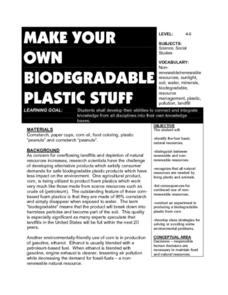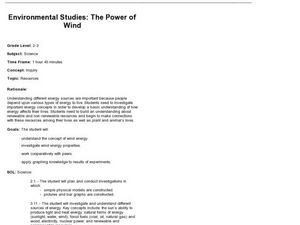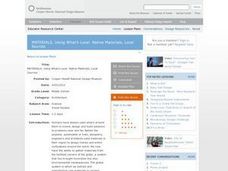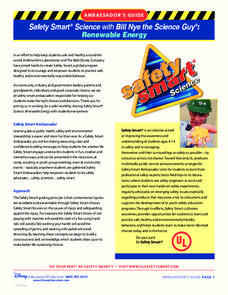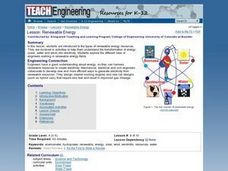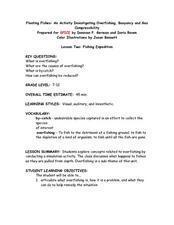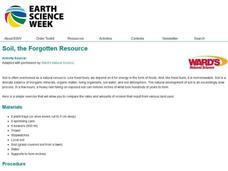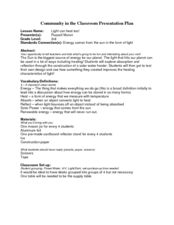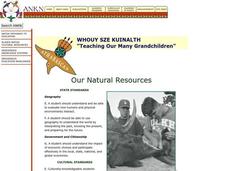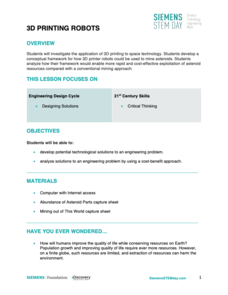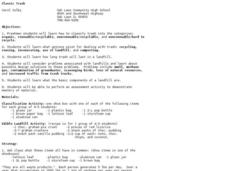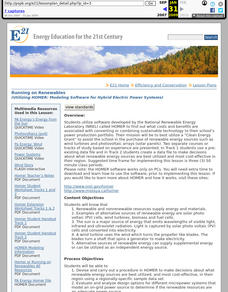Curated OER
Make Your Own Biodegradable Plastic Stuff
Young scholars identify the four basic natural resources. They distinguish bettween renewable and non-renewable resources. Pupils recognize that all natural resources are needed by living plants and animals. Students list consequences...
Curated OER
Environmental Studies: The Power of Wind
Investigate the prospect of wind as a renewable resource. Second and third graders make a pinwheel, answer critical thinking questions, and then attempt to use wind power to wind string. I would be more apt to use this lesson in a 1st or...
Curated OER
MATERIALS, Using What’s Local: Native Materials, Local Sources
Students consider the development of different societies. In this environmental building activity, students consider local resources and how societies choose to use them. Students use their findings to design a 'green' building for use...
Disney
Renewable Energy
Bring some energy to your physical science curriculum with this engaging Bill Nye the Science Guy instructional activity. Based on his Renewable Energy video, students explore the concepts of potential and kinetic energy and learn how...
Government of South Australia
Don't Waste Your Energy
Don't lift another finger, this physical and environmental science unit has everything you need to begin teaching your class about energy. Starting with a look at the greenhouse effect, these lessons and activities take young scientists...
Curated OER
TE Lesson: Renewable Energy
Learners examine renewable energy sources such as solar, water, and wind. They experiment to determine how renewable energy is transformed into electricity. They investigate the role of engineers who work in the field of renewable energy.
Society of Petroleum Engineers
Renewable and Nonrenewable Energy
Energize an environmental science unit on natural resources with this collection of instructional materials. From simple coloring sheets for primary grade children, to guiding questions for a high school research...
National Wildlife Federation
Fossil Fuel Extraction Activity
Extracting oil is more difficult than many think! Learners work together and get hands-on as they represent oil companies drilling for oil by simulating oil extraction using beans. They identify the challenges faced in using...
iCivics
Washington’s Water
It's easy to forget about something as simple as water, a substance that is easily available to many in the world. However, understanding water management and the importance of a renewable resource system becomes clear in an informative,...
Curated OER
Energy From Wind And Moving Water
Second graders investigate air and water as two sources of energy. They determine that wind and moving water are renewable resources that have advantages and disadvantages in their use. Through the design and construction of wind- and...
Curated OER
Floating Fishes: Fishing Expedition
A referenced PowerPoint is not included, but this lesson plan can still make an impact with emerging environmentalists. After introducing them to the facts about overfishing, they experiment with a fishing simulation using colored beads...
Curated OER
Soil, the Forgotten Resource
Students discuss soil understanding that is is often overlooked as a natural resource. In this science activity, students recognize that we depend on it for energy in the form of foods. Students experiment with six boxes of soil to help...
Curated OER
Light Can Heat Too!
Third graders explore absorption and reflection of light energy. In this solar energy lesson, 3rd graders explore how light energy transfers to heat energy through the construction of a solar water heater. Students will discuss and...
Curated OER
Attributes of Renewable Energy: From Nanopossibilities to Solar Power
Young scholars explore solar energy, why we use it and how we use it. In this renewable energy lesson students compare active and solar techniques.
Energy for Keeps
Renewable Energy Action Project: What's in Your Energy Portfolio?
Uncover the renewable energy potential in your region. The activity outlines an approach to research current practices and trends. Learners conduct surveys to assess the attitudes of the local population and prepare a paper summarizing...
University of Richmond
Renewing Inequality: Family Displacements through Urban Renewal 1950-1966
What is progress? Who bears its cost? High schoolers consider the questions as they review data on families displaced by urban renewal projects in the 1950s and 1960s. An interactive, curated data project asks historians to consider the...
Curated OER
How to Make a Wind Vane
Learners measure the direction of the wind. In this Science lesson, students make their own wind vane. Learners discuss the importance of wind direction and speed.
Curated OER
Our Natural Resources
Students discuss key terms used to describe ecosystems and how humans are altering natural resources. They listen to the book, Grandfather's Wisdom, and list the renewable and nonrenewable resources they have used or consumed in the past...
Discovery Education
3D Printing Robots
What is water worth to you? The answer probably depends on many different variables. Learners explore the value of water in space and what it takes to transport the resource to locations in a galaxy far far away. They then consider...
Curated OER
What is an Ecological Footprint?
Introduce youngsters to the term ecological footprint. Learners identify ways in which humans affect the environment. They look at the problems associated with the use of natural resources, and focus on ways to preserve natural...
Curated OER
Renewable Energy and
Students identify and explore renewable energy options and then research, develop and install a renewable energy system in their school or community. Students identify the use of renewable energy sources in the north, demonstrate their...
Curated OER
Classic Trash
Students investigate how trash is classified and the options to deal with it. In this trash and recycling instructional activity, students perform an activity to classify trash into organic, renewable/ recyclable, now...
Curated OER
Applied Science - Built Environment (2) Pre Lab
Second graders review how our society affects nature. In this energy lesson, 2nd graders discuss the different ways that energy is collected. They review renewable and nonrenewable energy sources.
Curated OER
Running on Renewables
Students investigate the costs and benefits of switching their school to sustainable technology energy production. They use software called HOMER developed by the National Renewable Energy Lab to do the cost/ benefit analysis. They then...
Other popular searches
- Non Renewable Resources
- Non Renewable Resources
- Science Renewable Resources
- Grade 7 Renewable Resources
- Renewable Resources Wood
- Cookies Renewable Resources
- Renewable Resources Lab
- Ecology Renewable Resources
- Renewable Resources Lessons
- Renewable Resources Worksheets
